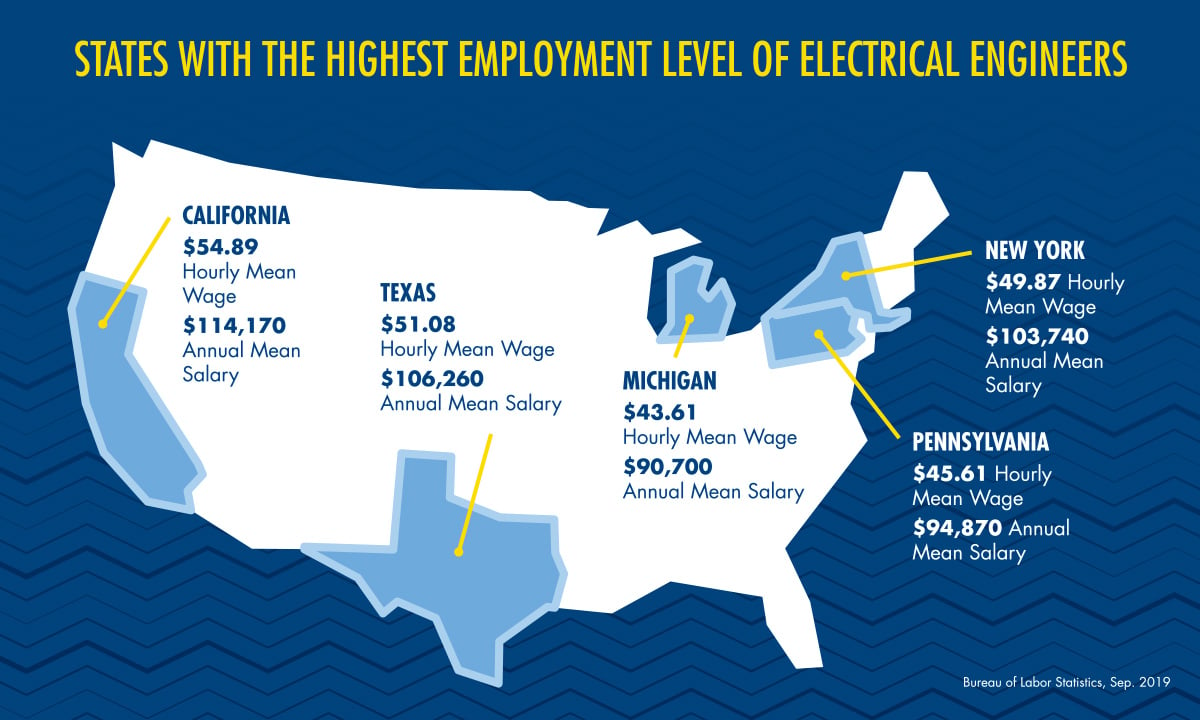


Requirements
and Restrictions
Learning Work?
or Live Event
Online Master’s Degree in Electrical Engineering Program
Classes Begin: September 21, 20262 years
Fully Online
45
Taught by experienced faculty and professionals in the field
Master of Science in Electrical Engineering
Drexel University’s accredited online Master’s in Electrical Engineering program equips you for technically challenging careers in industry, research, and development. It is also ideal if you plan to continue to a PhD in electrical engineering or related fields.
A master’s degree in electrical engineering readies you to make an impact in your workplace. You’ll study to become a leader in robotics, computing, wireless communications, and beyond. Electrical engineers have gone on to have careers at companies such as IBM, Facebook, Schlumberger, Oracle, Lockheed Martin, Intel, Dell, Intuit, HP, and Cyberonics 2.
Master's in Electrical Engineering Online Program Features
- 45 credits
- Rigorous study in Computing and Electrical Engineering
- Option of taking electives from the Engineering Management Program and other graduate disciplines
- Taught by experienced faculty who are also successful professionals in the electrical engineering field
- Highly interactive online method designed to challenge and engage, while remaining convenient for working professionals
What Does an Electrical Engineer Do?
The world runs on electricity and technology – it’s integrated into everything we do, from maintaining transportation grids to improving the microchip technology in our phones. Electrical engineers use their systems mindset to design, develop, test, and supervise manufacturing of electric cars, smart phones, GPS technology, and anything that uses magnetism and electricity.
What is a Master’s in Electrical Engineering?
A Master of Science in Electrical Engineering is a professional master’s degree. It is for bachelor’s-prepared engineers who want to expand their skillset to include management and technical expertise.
Today’s electrical engineers are innovators, managers, and problem solvers. With an MS in Electrical Engineering, you’ll continue to build a strong foundation in theory. In tandem, you’ll explore and understand new technology and trends in electrical engineering. This is also important if you are a forward thinker. Advances in technology will also produce a demand for engineers in the research and development phase.
What are the Requirements for a Master’s in Electrical Engineering?
Drexel’s online MS in Electrical Engineering requires completion of 45 quarter credits. You’ll take at least 30 credits from among the graduate courses offered in Drexel’s Department of Electrical and Computer Engineering. The remaining credits are electives which serve as a useful way to delve into your areas of interest or a specific career path. You may choose these courses from the following University departments:
- Computer Science
- Electrical and Computer Engineering
- Engineering Technology
- Project Management
- Systems Engineering
Those who want to step into a managerial role may opt to take courses from the Engineering Management Program (MSEM). While not a requirement, the department encourages you to complete a master’s thesis that may help you gain quality research skills. Choosing this thesis option allows you to count up to 9.0 research/thesis credits as part of your required credit hour requirements.
Do you Need a Master’s for Electrical Engineering?
Many electrical engineers launch their career with a bachelor’s degree. But technology is changing, bringing with it some new methods and ways of thinking. For those who want to further a career, there are at least three reasons to earn your master’s as an electrical engineer:
- A graduate degree allows electrical engineers to work as an instructor at some universities, or in research and development.
- The average salary for an electrical engineer is generous, especially with a master’s degree.
- Work to make digital history. Twenty years ago, we did not have half the advanced technology of today. Thanks to skilled electrical engineers, we now have robot-assisted surgery, self-driving cars, full computers, and endless information in the palm of our hands.
What Can I Do with a Master’s in Electrical Engineering?
With a master’s degree in electrical engineering, you might pursue a career in a wide range of sectors including aerospace, automotive, energy, IT, or telecommunications.
The job atmosphere for electronic engineers is one of growth. The U.S. Bureau of Labor Statistics projects that from now through 2026, the demand for electrical engineers will rise by 9%. This is faster than in other industries.
There are several reasons for this. Technology is advancing at the speed of light, creating a need for more complex consumer electronics. This growth fuels the need for qualified electrical and electronics engineers in research and development. Here, the task of future electrical engineers will be to design distribution systems related to new technologies such as power grid infrastructure, solar arrays, semiconductors, automation, and communications.
Electrical engineers work in commercial, industrial, military, and scientific sectors. In these settings, they hold many job titles related to their function:
- Circuits Engineer
- Design Engineer
- Electrical Controls Engineer
- Electrical Design Engineer
- Electrical Project Engineer
- Instrumentation and Electrical Reliability Engineer (I&E Reliability Engineer)
- Power Systems Engineer
- Project Engineer
- Test Engineer
Industries with the Highest Levels of Employment of Electrical Engineers
Industry
% of Industry Employment
Annual Mean Salary
Electric Power Generation, Transmission, and Distribution
4.59
$98,280
Electrical Equipment Manufacturing
4.06
$88,850
Communications Equipment Manufacturing
3.54
$107,440
Navigational, Measuring, Electromedical, and Control Instruments Manufacturing
3.25
$106,260
Architectural, Engineering, and Related Services
2.75
$100,900
Data from bls.gov
Master’s in Electrical Engineering Salary Expectations
At last check, the average annual salary for a master’s prepared electrical engineer is $124,404. But salary often depends on location, workplace, and experience. The following visualization shows electrical engineering salaries in the states with the highest employment level in this occupation:

Data from bls.gov
Related Program
Drexel University offers a variety of Graduate Minors that can be added to any master's degree program.
State restrictions may apply to some programs.
Curriculum
This program is organized into four 10-week quarters per year (as opposed to the traditional two semester system) which means you can take more courses in a shorter time period. One semester credit is equivalent to 1.5 quarter credits.
The Master of Science in Electrical Engineering curriculum encompasses 45.0 or 46.0 (with the Graduate Co-op option) approved credit hours, chosen in accordance with the following requirements and a plan of study arranged with the departmental graduate advisor in consultation with the student’s research advisor, if applicable. Before the end of the first quarter in the Department of Electrical and Computer Engineering, for a full-time student, or by the end of the first year for a part-time student, said plan of study must be filed and approved with the departmental graduate advisor.
A total of at least 30.0 credit hours must be taken from among the graduate course offerings of the Department of Electrical and Computer Engineering. These credits must be taken at Drexel University. No transfer credit may be used to fulfill these requirements, regardless of content equivalency.
The remaining courses needed to reach the minimum credit hour requirement for the degree program are considered elective courses. Elective courses can be chosen from among the graduate course offerings of the Department of Electrical and Computer Engineering; other departments within the College of Engineering; the School of Biomedical Science, Engineering and Health Systems; the Department of Mathematics; the Department of Physics; the Department of Chemistry and the Department of Biology. In order to have courses outside of these departments and schools count towards degree completion, they must be approved by the departmental graduate advisors prior to registration for said courses.
Please note that ECEC 500 Fundamentals of Computer Hardware and ECEC 600 Fundamentals of Computer Networks do not count toward the credit requirements to complete the MS in Electrical Engineering degree program.
| Required Courses | ||
| Electrical Engineering Core Courses | ||
| Select 21.0 credits of 500-999 level courses from the list below, unless otherwise specified: | 21.0 | |
|
Any ECEE (Elec & Computer Engr-Electroph)
|
||
|
Any ECEP (Elec & Computer Engr-Power Eng)
|
||
|
Any ECES (Elec & Computer Engr-Systems)
|
||
|
Any ECET (Telecommunications)
|
||
|
ECE 513
|
Introduction to Radar | |
|
ECE 514
|
Basic Electronic Warfare Concepts | |
|
ECE 531
|
Modern Transistors | |
|
ECE 603
|
Computing and Control | |
|
ECE 608
|
Decision-Making for Robotics | |
|
ECE 609
|
Mobile Sensing and Motion Planning | |
|
ECE 610
|
Machine Learning & Artificial Intelligence | |
|
ECE 612
|
Applied Machine Learning Engineering | |
|
ECE 613
|
Neuromorphic Computing | |
|
ECE 617
|
Reinforcement Learning | |
|
ECE 686
|
Cell & Tissue Image Analysis | |
|
ECE 687
|
Pattern Recognition | |
| General Electrical and Computer Engineering | ||
| Select 9.0 credits of 500-999 level courses from the list below: | 9.0 | |
|
Any ECE (Electrical Engineering)
|
||
|
Any ECEC (Elec & Comp Engr-Computers)
|
||
|
Any ECEE (Elec & Computer Engr-Electroph)
|
||
|
Any ECEP (Elec & Computer Engr-Power Eng)
|
||
|
Any ECES (Elec & Computer Engr-Systems)
|
||
|
Any ECET (Telecommunications)
|
||
| Elective Courses | ||
| Select 15.0 credits of 500-999 level courses from the list below: | 15.0 | |
|
Any AE (Architectural Engineering)
|
||
|
Any BIO (Bioscience & Biotechnology)
|
||
|
Any BMES (Biomedical Engineering & Sci)
|
||
|
Any CHE (Chemical Engineering)
|
||
|
Any CHEM (Chemistry)
|
||
|
Any CIVE (Civil Engineering)
|
||
|
Any CMGT (Construction Management)
|
||
|
Any CS (Computer Science)
|
||
|
Any ECE (Electrical Engineering)
|
||
|
Any ECEC (Elec & Comp Engr-Computers)
|
||
|
Any ECEE (Elec & Computer-Engr-Electroph)
|
||
|
Any ECEP (Elec & Computer Engr-Power Eng)
|
||
|
Any ECES (Elec & Computer Engr-Systems)
|
||
|
Any ECET (Telecommunications)
|
||
|
Any EGMT (Engineering Management)
|
||
|
Any ENGR (Engineering, General)
|
||
|
Any ENTP (Entrepreneurship)
|
||
|
Any ENVE (Environmental Engineering)
|
||
|
Any ET (Engineering Technology)
|
||
|
Any MATE (Materials Engineering)
|
||
|
Any (MATH) Mathematics
|
||
|
Any MEM (Mechanical Engr & Mechanics)
|
||
|
Any MGMT (Management)
|
||
|
Any MIS (Management Information Systems)
|
||
|
Any OPR (Operations Research)
|
||
|
Any PHYS (Physics)
|
||
|
Any PROJ (Project Management)
|
||
|
Any SYSE (Systems Engineering)
|
||
| Optional Co-op Experience * | 0-1 | |
|
COOP 500
|
Career Management and Professional Development for Master's Degree Students | |
| Total Credits | 45.0-46.0 | |
- *500-900 level courses in the following areas: AE, BIO, BMES, CHE, CHEM, CIVE, CMGT, CS, ECE, ECEC, ECEE, ECEP, ECES, ECET, EGMT, ENGR, ENVE, ET, MATE, MATH, MEM, OPR, PHYS, PROJ, PRMT, SYSE
Options for Degree Fulfillment
Although not required, you're encouraged to complete a Master’s Thesis as part of the program. Students who choose the thesis option may count up to 9.0 research/thesis credits as part of their required credit hour requirements.
Admissions Criteria
- A four-year Bachelor's Degree in Electrical Engineering or related field from a regionally accredited institution in the US or an equivalent international institution
- Examples of related fields include: Computer Engineering, Computer Science, Physics, Software Engineering, and Telecommunications Engineering
- A Bachelor's in "Engineering Technology" will generally not qualify
- A minimum cumulative grade point average of 3.0 for undergraduate work
- Half-cumulative GPA (final 2 years of coursework) will be considered for those close to this benchmark
- If any other graduate work has been completed, the average GPA must be at least 3.0
Required Documents
With multiple ways to submit documents, Drexel makes it easy to complete your application. Learn more by visiting our Completing Your Application Guide.
- A completed application
- Official transcripts from all universities or colleges and other post-secondary educational institutions (including trade schools) attended
- Two professional or academic letters of recommendation
- A 500 word essay on why you wish to pursue the program
- Resume
- Additional requirements for International Students
Tuition
The tuition rate for the academic year 2025-2026 is $1382 per credit.
For the academic year 2025-2026, students enrolled in an online graduate academic program will be charged a graduate online program fee of $125 per year.
- This program is eligible for Financial Aid.
- Special tuition rates available for Drexel University Alumni, Military members, and members of our Partner Organizations
- These rates apply only to new online students and students being readmitted.
- Tuition rates are subject to increase with the start of each academic year in the fall term.
- All students must contact applyDUonline@drexel.edu within the first two weeks of the term to request tuition savings for which they qualify.
- Special rates cannot be combined. If you qualify for more than one special rate, you'll be given the one with the largest savings.
- When receiving special tuition plans, you may not be able to combine them with other tuition benefits that may be available from Drexel University.
Academic Calendar
2025-2026 Academic Year
Term
Classes Begin
Classes End
Exams Begin
Exams End
Fall 2025
September 22, 2025
December 6, 2025
December 8, 2025
December 13, 2025
Winter 2026
January 5, 2026
March 14, 2026
March 16, 2026
March 21, 2026
Spring 2026
March 30, 2026
June 6, 2026
June 8, 2026
June 13, 2026
Summer 2026
June 22, 2026
August 29, 2026
August 31, 2026
September 5, 2026


© All Rights Reserved

